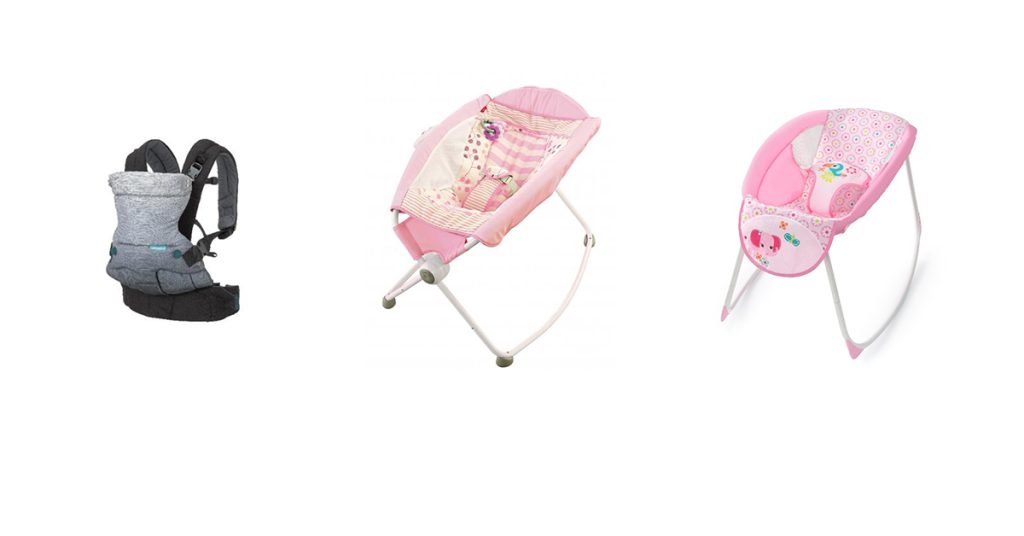Posts Tagged ‘“Defective Product”’
Baby Carriers Are Latest Children’s Product Recall
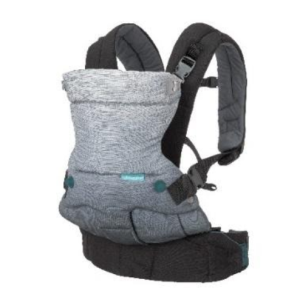 Parents place a great deal of trust in baby carriers to support their children. However, you should now check yours because it may not be as safe as you think.
Parents place a great deal of trust in baby carriers to support their children. However, you should now check yours because it may not be as safe as you think.
The Consumer Product Safety Commission (CPSC) issued a Feb. 6th recall notice for about 14,000 Infantino baby carriers sold by Amazon and Target between Nov. 15 and Dec. 20, 2019. Because the recalls took place over the holiday season, parents could have purchased a baby carrier or received one as a holiday gift.
While no injuries have been reported, the buckles on the infant carriers can break, causing a child’s fall. Parents should stop using the front-facing baby carriers and request a free replacement.
The Infantino carriers have a black or gray body, with black straps, and a front pocket. Look for the code sewn inside the carrier. This is the place to start because baby carriers often look similar.
|
Go Forward 4-in-1 Evolved Ergonomic Carrier |
2018 0619 |
|
Go Forward 4-in-1 Evolved Ergonomic Carrier |
2018 0719 |
|
Flip Front2back Carrier |
2018 0719 |
|
Up Close Newborn Carrier |
2018 0719 |
High Rate of Children’s Products Recalls
As you check if your baby carrier was recalled, look around your home for other children’s products, such as strollers, car seats, cribs and other baby furniture. Take a minute to visit the CPSC website and type in the product name. This is a good time of year to check children’s products because you may be using some of them more in the nice weather.
Children’s products have a high rate of recalls so it is best to check a few times of year and follow the news and the CPSC website. Manufacturers do not always contact parents directly and there are times parents may be using a hand-me-down recall product, making it harder to track product recalls or news about injuries.
But so far, 2020 has been a year to follow recall news. Just as the holiday season ended, a series of children’s product recalls began. On January 16th, the CPSC announced the recall of 2,000 “Baby Trend” strollers sold by Amazon and Target. Those too could drop children should the stroller hinge joints release and collapse under pressure.
Then on January 29th, the CPSC announced the recall of 165,000 infant sleepers from Summer Infant, Graco, Delta Enterprise Corp. and Evenflo. The inclined sleepers are the latest recalls in the wake of the Fisher-Price Rock ‘n Play, which was recalled in April 2019.
As authorities continue to investigate, families have reported more than 70 infant deaths in inclined infant sleepers. University of Arkansas researchers have studied these sleepers and recommended infants sleep on flat surfaces or less than a 10 degree incline if any. The Fisher-Price Rock ‘n Play and other sleepers placed children at a 30 degree incline, creating a risk for suffocation when infants attempted to turn.
Free Legal Consultation – Boston Product Liability Lawyer
Breakstone, White & Gluck has obtained record results for plaintiffs in Massachusetts cases involving personal injury, medical malpractice and product liability. If you or a loved one has been injured by an unsafe or defective product, our attorneys can advise you of your legal rights to seek compensation. For a free legal consultation, contact our product liability attorneys at 800-379-1244 or 617-723-7676 or use our contact form.
Healthy Lifestyle Wristbands Causing Skin Rash
 As it turns out, a popular wristband for tracking sleep and exercise was actually contributing to poor health.
As it turns out, a popular wristband for tracking sleep and exercise was actually contributing to poor health.
The Fitbit Force wristband has been recalled and pulled off the market after 9,900 reports it caused skin irritation. Another 250 consumers reported blistering. The product had only been on the market since October. The company has recalled about one million wristbands in the U.S. and 28,000 in Canada. The reactions can be caused by the stainless steel casing, materials used in the strap and adhesives used to assemble the product, the Consumer Product Safety Commission (CPSC) announced in its recall notice last week.
This recall involves Fitbit ForceTM wireless activity-tracking wristbands with model numbers FB402BK, FB402BKS, FB402SL and FB402SLS. Consumers should contact San Francisco-based Fitbit for a full refund. They can call (888) 656-6381 or visit www.fitbit.com and click on Recall/Safety info on the bottom right side of the home page.
The wristband serves as a pedometer, sleep monitor and watch. It is about ¾ inch wide and is made of plastic with a stainless steel casing and clasp and a small LED display screen.
The recalled wristbands had a wide distribution. They were sold at several major retailers, including AT&T, Apple Stores, Best Buy, Brookstone, Dick’s Sporting Goods, Radio Shack, REI, Sports Authority, Target and other stores. It was sold online at Amazon.com and Fitbit.com. Each was sold for about $130.
In a statement to the media, Fitbit said that “a thorough analysis by independent labs and medical experts revealed that the reactions reported by a small percentage of Force users were likely the result of allergic contact dermatitis.” The exact number appears to be in dispute as consumer watchdogs questioned the figures following the CPSC recall announcement. The company had previously issued a voluntary recall on its own on Feb. 21, offering a refund to consumers who wanted one.
Related:
Fitbit Recalls Force Activity-Tracking Wristband Due to Risk of Skin Irritation, Consumer Product Safety Commission
Reports of Rashes Spur Fitbit Recall, ABC News.
About Breakstone, White & Gluck
The Massachusetts product liability lawyers at Breakstone, White & Gluck have over 100 years combined experience handling injury cases involving defective products. If you have been injured, it is important to learn your rights. For a free legal consultation, contact us at 800-379-11379 or 617-723-7676 or use our contact form.
Product Liability: Infant Recliner Recall Sought After 5 Deaths
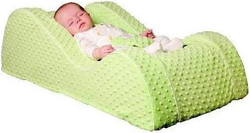 A manufacturer of baby recliners involved in five infant deaths is now the target of a lawsuit filed by the Consumer Product Safety Commission (CPSC).
A manufacturer of baby recliners involved in five infant deaths is now the target of a lawsuit filed by the Consumer Product Safety Commission (CPSC).
The CPSC filed a complaint against Baby Matters, LLC of Berwyn, Pennsylvania on Dec. 5 after the company refused to issue a voluntary recall of the Nap Nanny Generation One and Two and Chill models. The CPSC is aware of four infants who have died in Nap Nanny Generation Two recliners and one in a Chill model. It has received over 70 additional reports of children nearly falling out of the defective product.
The CPSC complaint alleges the company’s recliners contain defects in design, warnings and instructions, which pose a substantial risk of injury and death to infants. It seeks an order requiring the firm notify the public of the defect, remove it from store shelves and offer consumers a full refund. The company’s website and media reports state it has gone out of business as a result of its legal costs.
Some 155,000 of the recliners have been sold since 2009. The company sold 5,000 Nap Nanny Generation One models and 50,000 Nap Nanny Generation Two models between 2009 and early 2012. Both are now discontinued. A recall was issued in July 2010 announcing Generation One owners would receive an $80 coupon and improved instructions and warnings to consumers who owned the Generation Two Nap Nanny recliner.
The company developed the Nanny Chill model as an improvement. One hundred thousand Nap Nanny Chill models have been sold since January 2011. The recliners are priced about $130.
The 2010 recall came after the CPSC learned about one death that occurred in a Nap Nanny recliner and received 22 reports of infants hanging or falling out over the side, even though most had been harnessed in.
In a statement on the company’s website, owner/founder Leslie Gudel, said, “We do not believe the complaint has merit and stand behind the safety of our product when used as instructed.”
Later in the statement, she said, “No infant using the Nap Nanny properly has ever suffered an injury requiring medical attention. The Nap Nanny was designed and constructed for use only on the floor with the harness secured.”
Related:
Five infant deaths Prompt CPSC to Sue Manufacturer of Nap Nanny and Chill Infant Recliners, Consumer Product Safety Commission.
A message from Leslie Gudel – owner/founder Nap Nanny
Feds file suit against Nap Nanny maker after 5 infant deaths, 70 complaints, ABC News.
Read More
Defective Pool Slide Kills Woman in Andover, Mass.
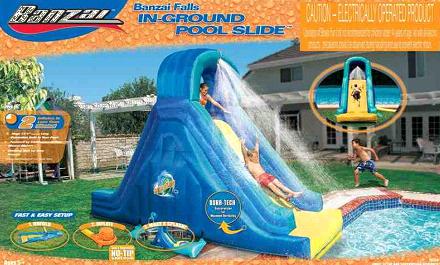 About 21,000 inflatable swimming pool slides are being recalled after the death of a 29-year-old woman in Massachusetts and two other people sustained serious personal injuries.
About 21,000 inflatable swimming pool slides are being recalled after the death of a 29-year-old woman in Massachusetts and two other people sustained serious personal injuries.
The Consumer Product Safety Commission (CPSC), Walmart of Bentonville, Ark. and Toys R Us Inc., of Wayne, NJ announced the recall Thursday, May 10. The Banzai inflatable water slides are designed for use with in-ground pools, but the CPSC says they pose a risk for injury. They can deflate and a user can hit the cement ground underneath the slide. The slide is also unsecure and can fall over, in both windy and still conditions. Finally, it carries inadequate warnings and instructions for users.
The CPSC is aware of one death and two serious personal injuries. In one case, a 29-year-old Colorado mother died in Andover, to the north of Boston. The woman died after going down a Banzai inflatable slide and hitting her head on the pavement below. The slide had been partially deflated.
The two injuries occurred in a similar manner, one leaving a 24-year-old man from Springfield, Mo. a quadriplegic. In a third case, an Allentown, Pa. woman fractured her neck.
The recalled pool slides were manufactured in China by Manley Toys, Ltd. and sold at Walmart and Toys R Us stores nationwide from January 2005 through June 2009. The defective product was sold for about $250. The vinyl slides have a blue base, yellow sliding mat and an arch going over the slide. The words ‘Banzai Splash’ are printed on the side of the defective slide.
The CPSC urges consumers to immediately stop using the defective product and return it to a Walmart or Toys R Us for a full refund. Consumers can also cut out the two safety warnings on the slide and return those for a refund. For additional information, visit www.walmart.com and www.toysrus.com.
Consumers can determine whether they have the slide by clicking here to look at pictures posted by the CPSC. If you still have the box and packaging, look for barcode number 2675315734 and model number 15734.
Read More
Recalled Coffee Makers Burn Nearly 40 People
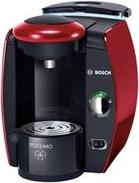 More than 1.7 million coffee makers have been recalled after reports some machines have sprayed hot liquid, leaving 37 people with second-degree burns.
More than 1.7 million coffee makers have been recalled after reports some machines have sprayed hot liquid, leaving 37 people with second-degree burns.
The Tassimo Single-Cup Brewers were recalled Feb. 9 by BSH Home Appliances Corp. of Irvine, California. Some 835,000 machines were recalled in the United States and 900,000 were recalled in Canada. The California manufacturer recalled the defective product voluntarily along with the Consumer Product Safety Commission (CPSC) and Health Canada.
The brewers are defective because they can burst and spray hot liquid and coffee grounds or tea leaves onto consumers. There were a total of 140 reports of the brewers spraying hot liquid. Among the 37 second-degree burns was a 10-year-old Minnesota girl who suffered serious facial and neck burns which required her to be hospitalized.
The defective coffee makers carried the brand names of Bosch and Tassimo Professional Brewers. The Bosch brewers were sold in several colors to consumers between the dates of June 2008 and February 2012 for between $100 and $250. The Tassimo Professional was sold on in black, directly to hotels and food service providers. The brewers were manufactured in Slovenia and China.
Consumers are advised to stop using the recalled coffee makers immediately and contact the firm to order a free replacement T Disc holder part to fix the mechanism. This is the part of the machine that holds the single serve coffee cup.
Consumers can visit www.tassimodirect.com/safetyrecall for the full list of recalled models and to request a replacement part. They can also call the firm toll-free at 866-918-8763.
Click here to read the recall notice from the CPSC.
Read More
Product Liability Warnings For Blender and Antinausea Drug
Consumers want to take note of two recent product safety announcements, one involving a popular blender sold at Target stores and another concerning an antinausea drug which has been linked to a potentially fatal heart rhythm.
Defective Blender: On Sept. 15, 2011, Target Corp. and manufacturer Select Brands, Inc. announced the recall of the Chefmate(r) 6-Speed Blender. Target and the Consumer Product Safety Commission have received 11 reports of the blender’s blades separating from the pitcher. In seven cases, consumers using the recalled Target product suffered serious lacerations and injuries to fingers and hands.
Approximately 304,000 defective blenders were sold at Target stores in Massachusetts and nationwide between September 2007 and Febrauary 2011. The blenders have the model number BL-10.
Consumers are advised to return the recalled product to Target stores for a full refund or contact the store’s guest relations department at 800-440-0680.
Drug Danger: Also on Sept. 15, the Food and Drug Administration (FDA) announced clinicians should avoid prescribing the drug ondansetron to patients with congenital long QT syndrome, which is a syndrome affecting the electrical functions of the heart. These patients are at risk for developing an abnormal and potentially fatal heart rhythm called torsades de pointes.
Ondansetron is widely known as Zofran, manufactured by GlasxoSmithKline. It is prescribed to prevent nausea and vomiting experienced during cancer chemotherapy, radiation therapy and surgery.
The FDA is revising the drug’s label to warn about the risk for the heart arrythmia. It will include recommendations for electrocardiogram monitoring for patients with electrolyte abnormalities, congestive heart failure and bradyarrhythmias and for patients taking other medications.
The FDA is also requiring GlaxoSmithKline to conduct a study to determine the degree to which ondansetron may trigger the complications.
The Massachusetts product liability lawyers at Breakstone, White & Gluck are experienced in representing individuals injured by defective products, including defective medical devices and improperly used medications. If you have been injured, contact us toll-free at 800-379-1244 for a free legal consultation. You can also use our contact form.
Read More
Defective Product Leads to Proposed Plea Deal in the Largest Criminal Penalty Ever Assessed Against a Medical Device Company
Guidant LLC, a division of Massachusetts’ company Boston Scientific, has plead guilty to two misdemeanor counts alleging the medical device maker failed to disclose product changes involving over 20,000 implantable heart monitor devices.
The medical device manufacturer plead guilty Monday, April 5 and will learn over the next few weeks whether U.S. District Judge Donovan Frank will accept a proposed $296 million plea deal – the largest criminal assessment ever proposed against a medical device company.
The Department of Justice accuses Guidant of changing the design of its implantable cardioverter defribrillators, or ICDs, and failing to notify the Food and Drug Administration (FDA) of subsequent problems that lead to a Class 1 medical recall – the most serious category which indicate a defective product has the potential to cause serious personal injury or wrongful death.
Guidant’s implantable cardioverter defribrillators, Ventak Prizm 2 DR and Contak Renewal 1 and 2, were designed to monitor patients for abnormal heart rhythms and deliver electric shocks to keep the heart beating properly. But Department of Justice officials say Guidant discovered as early as 2002 that Ventak had the potential to suffer an electric arc, which could short-circuit the device. Although problems continued with the defribrillator, Guidant didn’t issue a warning until 2005. In at least seven cases, the devices failed to issue a lifesaving shock and the patient died.
In 2005, Guidant sent a product update to doctors, advising that a yellow warning screen indicated a potentially serious problem. However, the FDA says the company should have sent a product correction, rather than a product update, since the change reduced the risk of serious injury, and should have notified the FDA of the change within 10 days. Guidant ultimately recalled its three devices in 2005.
Attorneys for the affected patients are now urging the court to reject the plea deal because it will not provide restitution payments to victims. The government prosecutor has argued that the victims have other remedies for compensation and that the applicable law does not require restitution. The prosecutor points to the fact that most of the victims have settled civil suits with the company and the company has paid out over $650 million in settlement and warranty payments. Additionally, $42 million of the plea amount is forfeited funds and victims can petition the Justice Department for their share.
For more information on the plea deal, see this Boston Globe article and this Star Tribune article.
Defective Refrigerator Recall Affects Massachusetts Consumers; Threat of Fire and Serious Injury or Death
On March 10, 2009, 1.6 million Maytag refrigerator units (also sold under other brand names) were voluntarily recalled due to several reported fire hazard incidents. Due to an electrical failure in the relay, the component that turns on the refrigerator’s compressor, units can become 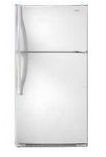 overheated and pose a serious fire and injury hazard.
overheated and pose a serious fire and injury hazard.
Before initiating the recall, Maytag had reports of 41 related relay malfunctions. Sixteen of those reports included information about property damage, ranging from smoke to serious kitchen fires. Though there have been no reports of personal injury or wrongful death, the serious repercussions of this defect place many Massachusetts consumers in harm’s way.
The refrigerators in this recall were sold between January 2001 and January 2004; some were sold in Massachusetts. A number of refrigerator brands are included in this recall: Maytag, Jenn-Air, Amana, Admiral, Magic Chef, Performa by Maytag, and Crosley.
Read More


